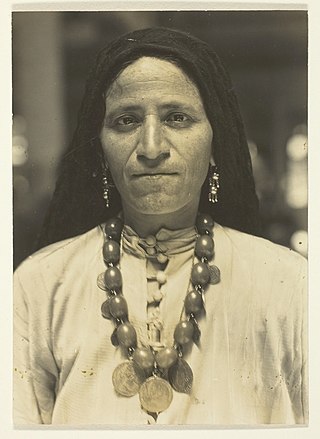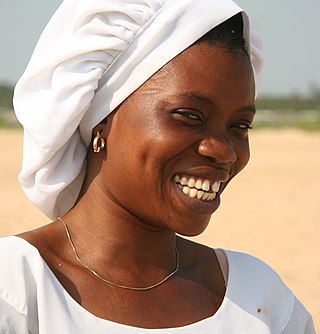Related Research Articles
Gender equality, also known as sexual equality or equality of the sexes, is the state of equal ease of access to resources and opportunities regardless of gender, including economic participation and decision-making; and the state of valuing different behaviors, aspirations and needs equally, regardless of gender.

The roles of women in the Arab world have changed throughout history, as the culture and society in which they live has undergone significant transformations. Historically, as well as presently, the situation of women differs greatly between Arabic speaking regions, their urban or rural population and age groups. Among other factors, these differences can be attributed to local traditions, culture and religion, women's social or legal status, their level of education, health or self-awareness. Since the 19th century, and notably through the influence of the colonization in North Africa, the Arab Renaissance in Egypt, Lebanon, and Syria, and the end of the Ottoman Empire, the social and economic changes in the Arab world have become greatly accelerated and diversified.

The International Center for Research on Women (ICRW) is a non-profit organization with offices in Washington, D.C., United States, New Delhi, Ranchi, and Jamtara, India, Nairobi, Kenya, and Kampala, Uganda. ICRW works to promote gender equity, inclusion and shared prosperity within the field of international development.
International Day of Zero Tolerance for Female Genital Mutilation is a United Nations-sponsored annual awareness day that takes place on February 6 as part of the UN's efforts to eradicate female genital mutilation. It was first introduced in 2003.

The status of women in Bangladesh has been subject to many important changes over the past few centuries. Bangladeshi women have made significant progress since the country's independence in 1971, where women in the region experienced increased political empowerment for women, better job prospects, increased opportunities of education and the adoption of new laws to protect their rights through Bangladesh's policies in the last four decades. Still, women in Bangladesh continue to struggle to achieve equal status to men due to societal norms that enforce restrictive gender roles as well as poor implementation of laws that were set to protect women.
The role of women in Egypt has changed throughout history, from ancient to modern times. From the earliest preserved archaeological records, Egyptian women were considered equal to men in Egyptian society, regardless of marital status.
Legal Momentum, founded in 1970, is a 501(c)(3) nonprofit and the nation's first and longest-serving legal advocacy group for women in the United States. Betty Friedan and Muriel Fox were its co-founders and Muriel Fox is an ongoing leader of the organization. Carol Baldwin Moody became President and CEO in April 2018. The organization, founded as the NOW Legal Defense and Education Fund, became Legal Momentum in 2004. Legal Momentum is a multi-issue organization dedicated to advancing women’s rights and gender equality, particularly in the areas of equal education opportunities; fairness in the courts; ending all forms of gender-based violence; workplace equality and economic empowerment. The organization employs three main strategies: impact litigation, policy advocacy, and educational initiatives. It is headquartered in New York City.
The United Nations Entity for Gender Equality and the Empowerment of Women, also known as UN Women, is a United Nations entity charged with working for gender equality and the empowerment of women. UN Women is charged with advocating for the rights of women and girls, and focusing on a number of issues, including violence against women and violence against LGBT people.
Since the December 2010 revolution in Tunisia and protests across the Middle East and North Africa (MENA) began, Tunisian women have played an unprecedented part in the protests. Habib Bourguiba began instituting secular freedoms for women in 1956, such as access to higher education, the right to file for divorce, and certain job opportunities. Women in Tunisia enjoy certain freedoms and rights that are denied to women in neighboring countries, although the social norms have shifted since 2011.

Violence against women in Guatemala reached severe levels during the long-running Guatemalan Civil War (1960-1996), and the continuing impact of that conflict has contributed to the present high levels of violence against women in that nation. During the armed conflict, rape was used as a weapon of war.

Women in Syria constitute 49.9% of Syria's population. According to World Bank data from 2021, there were around 10.6 million women in Syria. They are active participants not only in everyday life, but also in the socio-political fields. Syrian women and girls still experience challenges in their day-to-day lives, for example in the area of law and health care.

Women in Benin have gained more rights since the restoration of democracy and the ratification of the Constitution, and the passage of the Personal and Family Code in 2004. These both overrode various traditional customs that systematically treated women unequally. Still, inequality and discrimination persist. "Girls from the age of five or so are actively involved in housekeeping, sibling care, and agriculture." Society could think about of a woman's role are a housemaid, caretaker, or babysitter. A woman's role is to be a housemaker and nothing at all, but women have much potential to be more than a housemaker. With laws taking charge of what a woman can be as a career of how they are being useful more in the house than in a men's job position. Moreover, these rules apply to women by their gender that has not changed for a while. And there has been inequality based on being the opposite gender which these rules should immediately change if the society wants to get better to have equality for the female race.
State-sponsored Internet propaganda is Internet manipulation and propaganda that is sponsored by a state.

The Women's Protection Units or Women's Defense Units is an all-female militia involved in the Syrian civil war. The YPJ is part of the Syrian Democratic Forces, the armed forces of Rojava, and is closely affiliated with the male-led YPG. While the YPJ is mainly made up of Kurds, it also includes women from other ethnic groups in Northern Syria.

Women's empowerment may be defined in several ways, including accepting women's viewpoints, making an effort to seek them and raising the status of women through education, awareness, literacy, and training. Women's empowerment equips and allows women to make life-determining decisions through the different societal problems. They may have the opportunity to re-define gender roles or other such roles, which allow them more freedom to pursue desired goals.
Gender inequality refers to unequal treatment or perceptions of individuals wholly or partly due to their gender or sex. It arises from differences in socially constructed gender roles. Gender inequality in Nigeria is influenced by different cultures and beliefs. In most parts of Nigeria, women are considered subordinate to their male counterparts, especially in Northern Nigeria as well as in other sectors including the Nigeria music industry, politics, and education sector. It is generally believed that women are best suited as home keepers.
Feminism in Pakistan refers to the set of movements which aim to define, establish, and defend the rights of women in Pakistan.This may involve the pursuit of equal political, economic, and social rights, alongside equal opportunity. These movements have historically been shaped in response to national and global reconfiguration of power, including colonialism, nationalism, Islamization, dictatorship, democracy, and the War on Terror. The relationship between the women's movement and the Pakistani state has undergone significant shifts from mutual accommodation to confrontation and conflict.
Morénike Giwa Onaiwu is an American educator, author, and autism and HIV advocate. Alongside E. Ashkenazy and Lydia Brown, Onaiwu is an editor of All the Weight of Our Dreams, an anthology of art and writing entirely by autistic people of color published by the Autism Women's Network in June 2017.

Feminism in Indonesia refers to the long history of discourse for gender equality to bring about positive social change in Indonesia. The issues women in Indonesia currently are facing include gender violence, underage marriages, and lack of representation in the political system. Feminism and the women's right movement began during colonial Indonesia under Dutch rule and were spearheaded by the national heroine Kartini, a Javanese noblewoman who advocated for the education of all women and girls regardless of social status. In the early 19th century, women's rights organizations and movements were allowed to developed under Budi Utomo, the first Indonesian Nationalist organization. Modern day Indonesian feminism include and are influenced by both fundamentalist and progressive Islamic women's organizations.

Christine Butegwa is a feminist, writer, entrepreneur, and gender and development activist based in Uganda. She is the author of the book titled, "The Mighty Angwech and More: Female Legends from Ugandan folklore". Christine is an interior designer and was the director of Rukundo Design Décor. In 2002, she co-produced a video, "A Tale of Ten Years: The Experience of Women and Gender Studies, Makerere University with Murerwa Rian". She is currently the founder and CEO of Jabali Consulting Ltd, a pan African gender and development consulting firm based in Kampala, Uganda.
References
- 1 2 3 4 5 "Sarah Hesterman". Global Thinkers Mentors. Retrieved 2023-09-22.
- ↑ "Who are the 100 Women 2014?". BBC News. 2014-10-26. Retrieved 2023-09-22.
- 1 2 3 "Military Child Spotlight: Sarah Hesterman". Operation Homefront. 2015-04-10. Retrieved 2023-09-22.
- 1 2 3 Montes, Alexandre (2015-05-01). "Air Force Military Child of the Year Sarah Hesterman puts the 'stand' in standard". U.S. Air Forces Central. Retrieved 2023-09-22.
- ↑ Gharib, Malaka (July 13, 2016). "Why These Teen Girls Give Helen Clark More Snaps Than Beyoncé". NPR. Retrieved September 22, 2023.
- ↑ "ASD students raise money for education of two girls". Gulf Times. 2016-10-30. Retrieved 2023-09-22.
- ↑ Hillebrenner, Melissa (2015-06-18). "Proof That When Girls Come Together There's Nothing They Can't Do". HuffPost. Retrieved 2023-09-22.
- ↑ "Women's Media Center". womensmediacenter.com. Retrieved 2024-01-02.
- ↑ "#ShePersisted - Who We Are". She Persisted. Retrieved 2024-01-02.
- ↑ Di Meco, Lucina; Hesterman, Sarah (2021-11-30). "How Digital Media is Threatening Women's Rights and Democracy". Ms. Magazine. Retrieved 2023-09-22.
- ↑ "How social media is failing women in Tunisia". NADJA. 2023-08-29. Retrieved 2023-09-22.
- ↑ "#ShePersisted - Research and Thought Leadership". She Persisted. Retrieved 2024-01-02.
- ↑ "Empower Women Announces the 2016-2017 Champions for Change". EmpowerWomen. 2016-12-10. Retrieved 2023-09-22.
- ↑ "College Freshman Joins UN Program To Champion The Economic Empowerment Of Women". GirlTalkHQ. 2017-01-11. Retrieved 2023-09-22.